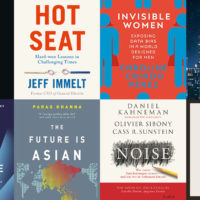Subramaniam outlined a framework that enables businesses to work out where they stand in harnessing the power of data for competitive advantage and identify related opportunities and risks. This consists of four tiers:
- Operational efficiencies based on interactive data from assets
- Advanced operational efficiencies based on interactive data from products and services
- Data-driven services from value chains
- Data-driven services from digital platforms, for example by connecting product users by third- party entities
Not all companies need to aim to reach the highest of these tiers. B2B companies do not have the same opportunities to exploit customer data as B2C firms, for example. But the framework can help ensure that you are not leaving money on the table in terms of opportunities to use data.
It can also help identify potential new data-driven competitors. For example, e-commerce platforms Alibaba and Tencent have taken significant market share in consumer loans and deposits at the expense of traditional Chinese banks by using the data they hold on customers’ spending patterns and financing needs.
This is a prime illustration of how competitors in the digital age are not just selling the same products and services – digital competitors compete by exploiting similar data.
Digital transformation obviously creates ethical questions about privacy and the use and sharing of customer data, but it can have great benefits for customers as well as for the company, said Subramaniam.
“One of the problems that legacy firms have is that unfortunately digital platforms operated like in the Wild West for many years and basically abused their power in terms of what they did with customer data, so it is an uphill battle for legacy firms to make the claim that they are not going to do the same, but they have to focus on the value they are giving customers,” he said.
These benefits can be considerable and significantly outweigh privacy concerns, he added, using the example of modern asthma inhalers which can save lives as a result of new features that can prevent asthma attacks. “It’s about the benefits relative to the costs of a loss of privacy. It’s always a trade-off.”
And these benefits are not just confined to customers. There is a huge opportunity to use the power of data to deliver sustainability benefits by reducing energy usage and waste of resources, he noted.
Concerns over loss of privacy are in any case becoming less important now that people widely share data in exchange for access to all manner of services. “I think the genie is out of the bottle,” he said. “This is where the world is going, whether you like it or not, and you have to navigate through this, and do it in an ethical way – and for that you need to have a conviction that what you are trying to do is to generate a real benefit.”
YouTube




